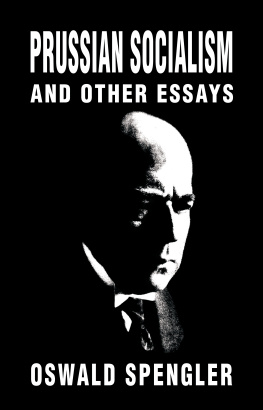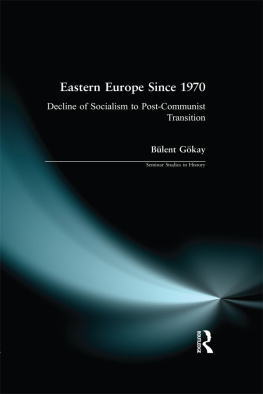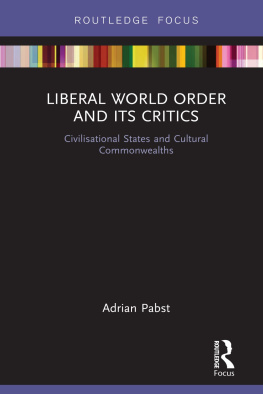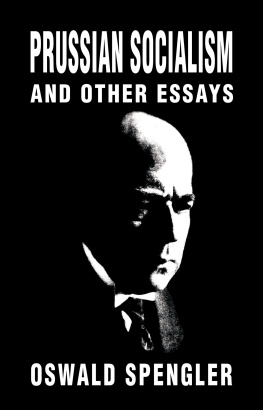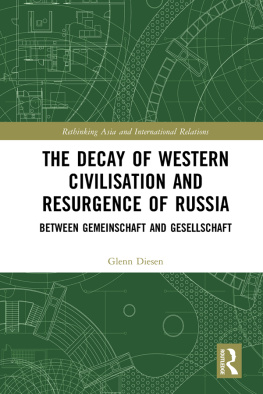Prussian Socialism & Other Essays
by Oswald Spengler
Annotated and Introduced by
K R Bolton
Prussian Socialism & Other Essays
by Oswald Spengler
Annotated and Introduced by K R Bolton
Copyright 2018 Black House Publishing Ltd
All rights reserved. No part of this book may be reproduced in any form by any electronic or mechanical means including photocopying, recording, or information storage and retrieval without permission in writing from the publisher.
Black House Publishing Ltd
Kemp House
152 City Road
London, United Kingdom
EC1V 2NX
www.blackhousepublishing.com
Email:
Table of Contents

Oswald Spengler
Oswald Spengler An Introduction to His Life and Work
F or the Right one might disagree with Oswald Spengler, but one cannot ignore him. Of course, for the Left and orthodox academia, the simplistic option is to ignore him. Spengler continues to pose a challenge, and his great questions of our epoch have yet to be fully answered. But it is essential that the questions are at least asked.
One of the outstanding features of Spenglers morphological theory of history is that it is unfolding before our eyes, at every moment. While saying something is self-evident might be and generally is a method of claiming one is correct without recourse to evidence, I would challenge anyone who knows at least the fundamentals of Spenglers cultural morphology to look around their own society, perhaps even their own immediate environs, and deny that Spengler is right.
Early Life
Oswald Spengler was born in Harz, Germany, on the 29 May 1880, the only son and eldest of four children, from a paternal line of mine workers although the father was a postal official when Oswald was born - and a mother with artistic abilities.
In 1890 the family moved to the university city of Halle, where Oswald received a classical education, studying Latin, Greek, mathematics and the natural sciences. From his mothers side, he developed an affinity for the arts, particularly that of drama, poetry and music.
Even as a 14 year old, while writing plays, stories and poems, Spengler was starting to think about the great issues. Hence, in 1894 he wrote an essay entitled Greater Germany: New Order in Europe and the Rest of the World.
It seems that it was already while a student at the Gymnasium that Spengler first came under the enduring influence of the philosophers Goethe and Nietzsche.
Spengler entered the University of Munich in 1901, the year of his fathers death, and proceeded to Berlin and to Halle. His main courses of study remained the Classical cultures, mathematics and the physical sciences. At Halle he prepared his doctoral dissertation on the Greek philosopher Heraclitus, receiving his Doctorate in 1904. He wrote a secondary dissertation required for becoming a High School teacher. The subject was The Development of the Organ of Sight in the Higher Realms of the Animal Kingdom.
He taught mathematics, physical sciences, history and German literature at Saarbrcken, Dsseldorf and Hamburg. He was a good teacher, whose style, according to former students, was both lively and intuitive.
Decline of the West
Here Spengler started to write a book of observations on the political situation, to be entitled Conservative and Liberal. However, this developed far beyond the original intention, and became The Decline of The West. The First World War confirmed his analysis. He lived in reduced circumstances due to losses of investments, working by candlelight in cheap lodgings, and writing as a cultural adviser for the press.
Despite the war time hardships by 1917 the first volume of his philosophical masterpiece, Form and Actuality, was ready, and was published the following year. The volume was an immediate success.
Professional historians were offended by the presumptuousness of Spengler not being a trained historian - offering a work of such magnitude. Yet, Spengler was looking at history from the heights, and not from beneath the quagmire of formal academia. Stimely makes a comment that remains pertinent: [W]ith regard to the validity of his postulate of rapid Western decline, the contemporary Spenglerian need only say to these critics: Look about you. What do you see?
To the defeated Germans, The Declineof The West put their predicament into world-historical context, and also offered a vision for the future of Western Civilisation as a unified cultural organism. So with such promise, a second, revised edition of The Decline of The West, Volume One, was published in 1922, soon followed by the second volume, Perspectives of World-History.
Despite the professional critics, there were scholars of note who immediately spoke in favour of Spengler. His English translator, Charles Francis Atkinson, writing in the translators preface for the 1926 English edition of The Decline of the West, refers to an article by Dr Eduard Meyer, a scholar of ancient history of worldwide repute, in Deutsche Literaturzeitung in 1924 in which Meyer, in contrast to what Atkinson calls the first burst of criticism, insists upon the fruitfulness of certain of Spenglers ideas. The two remained friends until Meyers death in 1930.
Spengler also maintained an exchange of ideas with many other scholars in the study of Civilisations. Hans Erich Stier, Professor of Ancient History, assured Spengler that, despite the original perplexity, his thought has exerted a great influence everywhere, and was being imitated widely by historical scholars.
Pessimism?
Regardless of Spenglers persistent ill-health and long periods of scholarly solitude, he sought to directly influence political events. Despite the criticism of pessimism or fatalism that continues to be levelled at Spengler, he did not see this in his historical morphology, and one might say that because all mortals are fated to die, one might as well give up without living whatever lifes course that might unfold. So it is with Cultures, according to Spengler, and the scholar sought to influence events politically.
Spengler had addressed the misunderstanding of pessimism as early as 1921 when he replied to those who saw his outlook as a prophesy of dreadful catastrophe, writing of The Decline of The West: My title does not imply catastrophe. Perhaps we could eliminate the pessimism without altering the real sense of the title if we were to substitute for decline the word fulfilment
It was from Germany, re-imbued with the Prussian lan, from which the 20 th century revival of Western Civilisation had to proceed in answer to 19 th century English political-economics. However, Spengler was not an agitator, an organiser, a man of party politics or of mass movements. He sought to influence those who might take Germany, and thereby The West, into new directions.
Over the period 1914 to 1917, while engaged in writing The Decline, Spengler continued to write other material of a historical-political nature, including an essay, To the German Nobility, calling for a monarchist regime and a system of government that would raise a meritocracy, while eschewing parliament as the means by which the newspaper reading public believes that it is politically empowered.
German Socialism
Despite the initial difficulty in finding a publisher, the defeat of Germany garnered The Decline

